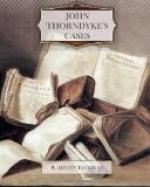“Good-morning to you, gentlemen,” said Mr. Marchmont, shaking hands cordially. “I have brought a client of mine to see you, and when I tell you that his name is Solomon Loewe, it will be unnecessary for me to say what our business is.”
“Oddly enough,” replied Thorndyke, “we were, at the very moment when you knocked, discussing the bearings of his case.”
“It is a horrible affair!” burst in Mr. Loewe. “I am distracted! I am ruined! I am in despair!”
He banged the bandbox down on the table, and flinging himself into a chair, buried his face in his hands.
“Come, come,” remonstrated Marchmont, “we must be brave, we must be composed. Tell Dr. Thorndyke your story, and let us hear what he thinks of it.”
He leaned back in his chair, and looked at his client with that air of patient fortitude that comes to us all so easily when we contemplate the misfortunes of other people.
“You must help us, sir,” exclaimed Loewe, starting up again—“you must, indeed, or I shall go mad. But I shall tell you what has happened, and then you must act at once. Spare no effort and no expense. Money is no object—at least, not in reason,” he added, with native caution. He sat down once more, and in perfect English, though with a slight German accent, proceeded volubly: “My brother Isaac is probably known to you by name.”
Thorndyke nodded.
“He is a great collector, and to some extent a dealer—that is to say, he makes his hobby a profitable hobby.”
“What does he collect?” asked Thorndyke.
“Everything,” replied our visitor, flinging his hands apart with a comprehensive gesture—“everything that is precious and beautiful—pictures, ivories, jewels, watches, objects of art and vertu—everything. He is a Jew, and he has that passion for things that are rich and costly that has distinguished our race from the time of my namesake Solomon onwards. His house in Howard Street, Piccadilly, is at once a museum and an art gallery. The rooms are filled with cases of gems, of antique jewellery, of coins and historic relics—some of priceless value—and the walls are covered with paintings, every one of which is a masterpiece. There is a fine collection of ancient weapons and armour, both European and Oriental; rare books, manuscripts, papyri, and valuable antiquities from Egypt, Assyria, Cyprus, and elsewhere. You see, his taste is quite catholic, and his knowledge of rare and curious things is probably greater than that of any other living man. He is never mistaken. No forgery deceives him, and hence the great prices that he obtains; for a work of art purchased from Isaac Loewe is a work certified as genuine beyond all cavil.”
He paused to mop his face with a silk handkerchief, and then, with the same plaintive volubility, continued:
“My brother is unmarried. He lives for his collection, and he lives with it. The house is not a very large one, and the collection takes up most of it; but he keeps a suite of rooms for his own occupation, and has two servants—a man and wife—to look after him. The man, who is a retired police sergeant, acts as caretaker and watchman; the woman as housekeeper and cook, if required, but my brother lives largely at his club. And now I come to this present catastrophe.”




